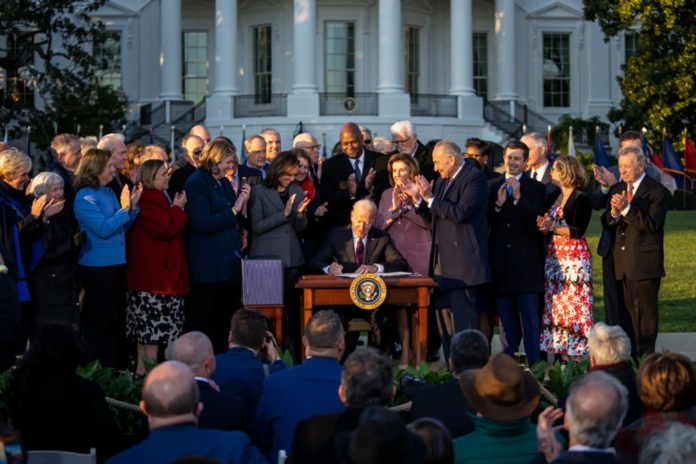By Michael Ge
On Monday, November 15th, President Joe Biden, surrounded by members of Congress and his cabinet, triumphantly signed the Infrastructure Investment and Jobs Act into law. The bill, commonly known as the Bipartisan Infrastructure Deal, is a $1 trillion investment into American infrastructure. Proponents of the bill argue that it will repair America’s crumbling infrastructure. President Biden praised the bill by proclaiming, “With this law, we focused on getting things done.” The bill contains funding for repairing traditional infrastructure such as roads and bridges. It also contains funding for broadband access and renewing America’s electric grid among many other projects.
On November 5th, the House of Representatives finally passed President Joe Biden’s infrastructure plan. After passing the Senate, the bill languished in the House for months while Biden’s budget faced serious obstacles in the Senate. Ultimately the infrastructure bill was passed with bipartisan support.
Although the bill did receive bipartisan support, it did not receive the same level of support it had in the Senate. It faced opposition from six progressive Democrats like Representative Alexandria Ocasio Cortez because they wanted Biden’s Build Back Better plan to be passed simultaneously. A group of 13 moderate Republican representatives ultimately voted for the bill despite the vast majority of their fellow Republicans voting against it.
Although the bill had bipartisan support in both chambers of Congress and polling showed that it was popular with the American people, it was not without its detractors. Controversal representative Majorie Taylor Greene voiced her harsh opposition to the bill claiming that it would kill jobs; other Republicans also voiced their opposition to the bill as well. Former President Donald Trump has already announced his endorsement of candidates running against several of the senators and representatives who voted for the bill.
Now that a key part of President Biden’s agenda has been passed, the focus for the President and Congressional Democrats now shifts to passing the other part of his agenda, the Build Back Better plan. In the face of poor election results and low approval ratings, passing the Build Back Better plan has become even more important than it already was.










